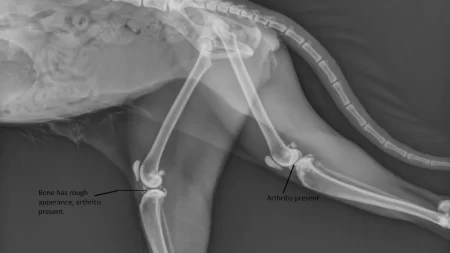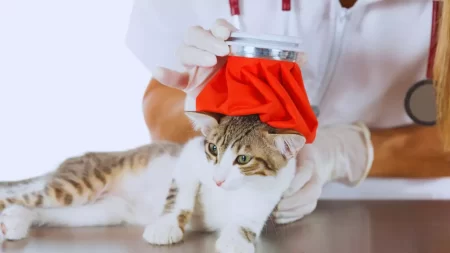To kill roundworms in cats, several treatments are available including deworming medication, prescription diets, topical medication, and environmental cleaning. Consult with your veterinarian to determine the most effective treatment plan for your cat’s case. Additionally, practicing good hygiene habits and regularly cleaning your cat’s bedding and litter box can help prevent the spread of roundworms.
Struggling to keep your kitty safe from roundworms? You need a more powerful solution than what you’re using now. This article will tell you how to get rid of pesky roundworms in cats. Get the security you want! Don’t let parasites take control of your feline companion – read on to guarantee your cat’s safety.
Roundworms, aka nematodes, are parasites that can cause major health issues in cats. Toxocara cati and Toxascaris leonina are the most common. They interfere with the cat’s ability to absorb nutrients, leading to malnutrition and other symptoms. Moreover, they can infect other animals and people too, so it is essential to take action. Treating roundworm infections in cats is possible with various methods.
It is essential to understand how cats get worms. They enter through contaminated water or soil. Also, cats can get roundworms if they consume infected prey. In kittens, the worms can be passed from their mother.
Once inside the intestine, the worms grow quickly because they can feed on digested particles. Symptoms vary depending on how bad the infection is and the age of the cat. Elderly cats usually have milder symptoms. Common signs include:
- Coughing
- Poor growth/weight gain
- Dull fur
- Hairless patches near eyes/head
- Irregular diarrhea/stool with worms/eggs
- Vomiting
- Streaks of blood in the stool for heavy infestations
Causes of Roundworms in Cats
Roundworms are common intestinal parasites in cats and humans. They can be contracted in several ways. It’s important to know the causes, how to prevent them, and how to treat them.
These eggs can enter the environment when cats defecate in areas other cats can access. They can lay dormant for a long time, so reinfection may happen even with treatment. Ingesting the parasites from an environmental source or insects, or consuming another animal with worms, is possible.
Kittens can also become infected by their mother during pregnancy or nursing. This is known as vertical transmission. So, kittens should be regularly dewormed according to a vet, even if they don’t show any signs of worms.
Roundworms are hard to detect without the help of a veterinarian. Symptoms like weight loss, vomiting, diarrhea, or an overall unhealthy look can be from other illnesses. A fecal test will identify active infections, but not the origin or how long the cat has been infected. Treatment usually consists of:
- Oral medication or injectable worming treatments that kill adult worms.
- Larvae present in tissue may need additional treatment like supportive nutrition and antiparasitic drugs.
Symptoms of Roundworm Infection
Roundworms are a common intestinal parasite in cats, especially kittens. They can get it from their mother’s milk and it causes health issues. It’s important to know the signs so you can get treatment quickly.
Signs of roundworms:
- Seeing worms in their vomit or poop
- Diarrhea
- Weight loss or being tired
- Belly looks big
- No energy and not eating
- Dull fur and dry, flaky skin
- Coughing or throwing up often
Your vet can check for worms in your cat’s stool by looking at it under a microscope. If there are roundworms, your vet will tell you the best way to treat them. Treatment often includes an antihelmintic medication that works and is safe. Your vet will decide the best medicine for your cat.
Diagnosis and Treatment of Roundworms in Cats
Roundworms, also known as nematodes, are very common in cats. Young cats are more likely to be affected. Left untreated, it can cause serious health issues. It is important to be aware of the signs and symptoms.
They are white or tan and look like round strands of spaghetti. Infection with roundworms is a common cause of diarrhea in cats. Other symptoms include weight loss, vomiting, dull coat, dehydration, and abdominal discomfort.
If your cat is showing any signs or symptoms, take them to the vet. The vet may diagnose the roundworm infection with a physical examination. Lab tests, such as a fecal exam or radiographs, may be used to confirm the diagnosis.
Treatment includes an anti-parasitic medication. Plus, supportive care such as fluid therapy or vitamin or probiotic supplementation if needed. Follow-up veterinary visits are recommended for kittens younger than 12 weeks old. Repeat treatment to make sure all the worms have been removed.
Prevention of Roundworms in Cats
Roundworms are a common and easy-to-transmit parasite for cats. To protect cats and the people around them, it’s important to know the basics of prevention and early detection.
To prevent roundworms, use regular deworming as recommended by a vet, practice good hygiene and sanitation, keep fleas away, feed kittens (under 6 months) correctly, dispose of pet waste properly, and stay away from strays.
When deworming other animals, get advice from a vet to identify the kind of roundworms. Over-the-counter medications may not always work against all types, stages, or strains of roundworms.
Be aware of the signs and symptoms of roundworms so you can act quickly. These include:
- Difficulty breathing
- Vomiting
- Convulsions
- Diarrhea
- Furry tongue
- Coughing
- Weight loss
Depending on the cat’s health, extra care may be needed beyond traditional treatments.
Home Remedies for Roundworm Treatment
Roundworms, also called nematodes, are a common type of intestinal parasite in cats. They usually don’t cause symptoms in adult cats, but can be dangerous for kittens and cats with weak immune systems. There are home remedies to help treat and stop roundworm infestations.
One home remedy is administering over-the-counter deworming medication. These contain active ingredients like pyrantel pamoate or fenbendazole. It is best to get two treatments, spaced two weeks apart. All animals in the home should get both treatments.
To stop future infestations:
- Clean and disinfect areas your cat goes to the bathroom (litter box and outdoors).
- Vacuum and mop any areas your cat has been sleeping, as eggs can live in carpet fibers.
- Treat lawns with fertilizer and bug killer. They kill roundworm eggs deposited by wildlife that have had contact with your pet.
- Feed your pet high-quality food to help strengthen their immune system, making them less likely to get an infection from parasites.
Natural Remedies for Roundworm Treatment
Roundworms are a widely found parasite in cats that may cause serious health problems if not treated properly. Fortunately, there are natural solutions to manage and even kill roundworms in cats.
- Garlic: Garlic has strong antibacterial, antifungal, and antiviral properties. Crush garlic and mix it into the cat’s food daily to fight off roundworm infections.
- Fenbendazole: This is an over-the-counter medicine used to treat many parasites, including roundworms. You can buy it in pet stores or online. To kill off the worms completely, cats should take it for one week.
- Apple cider vinegar: Dilute ACV with water and put it in the cat’s drinking water. This reduces acidity in the stomach, making it harder for parasites, like roundworms, to survive.
- Diet changes: Let the cat access food with vitamins and minerals, like Vitamin A and zinc. This strengthens the body’s natural immunity against roundworm eggs, helping the cats expel them through their stool. Also, routinely deworm both indoor and outdoor cats, using pyrantel pamoate suspension and milbemycin oxime/praziquantel tablets. These work on all types of intestinal worms, including hookworms and tapeworms, along with roundworms.
Conclusion
Eliminate roundworms from your cat’s environment by following the advice of a vet. Treatments include oral or injectable medicines. For prevention, clean the litterbox regularly and wash your hands after handling cats and kittens. Increase the cleanings per week and avoid contact with feces. Also, consider natural worming treatments such as garlic – but speak with a vet first.
With proper caution and treatment, roundworms can be defeated!




![What Kills Roundworms In Cats? [A Complete Guide] what kills roundworms in cats](https://justcatlover.com/wp-content/uploads/2023/02/what-kills-roundworms-in-cats-1024x576.jpg)


